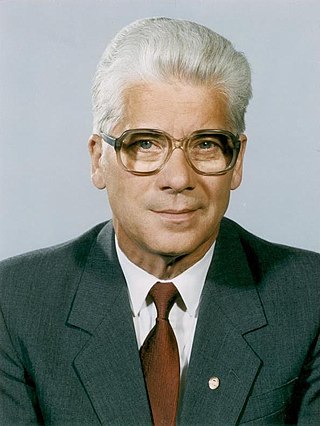
The Socialist Unity Party of Germany was the founding and ruling party of the German Democratic Republic from the country's foundation in 1949 until its dissolution after the Peaceful Revolution in 1989. It was a Marxist–Leninist communist party, established in 1946 as a merger of the East German branches of the Communist Party of Germany and Social Democratic Party of Germany.

Egon Rudi Ernst Krenz is a German former politician who was the last Communist leader of the German Democratic Republic during the Revolutions of 1989. He succeeded Erich Honecker as the General Secretary of the ruling Socialist Unity Party of Germany (SED) but was forced to resign only weeks later when the Berlin Wall fell.

Günter Schabowski was an East German politician who served as an official of the Socialist Unity Party of Germany, the ruling party during most of the existence of the German Democratic Republic (GDR). Schabowski gained worldwide fame in November 1989 when he improvised a slightly mistaken answer to a press conference question about the future of the Berlin Wall. That raised popular expectations much more rapidly than the government planned and so massive crowds gathered the same night at the Wall, which forced its opening after 28 years. Soon afterward, the entire inner German border was opened.

Hans Modrow was a German politician best known as the last communist premier of East Germany.

Wilhelm Stoph was a German politician. He served as Chairman of the Council of Ministers of the German Democratic Republic from 1964 to 1973, and again from 1976 until 1989. He also served as chairman of the State Council from 1973 to 1976.

Horst Sindermann was a Communist German politician and one of the leaders of East Germany. He became Chairman of the Council of Ministers in 1973, but in 1976 he became President of the Volkskammer, the only member of the Socialist Unity Party of Germany to hold the post.
The German Democratic Republic was created as a socialist republic on 7 October 1949 and began to institute a government based on the government of the Soviet Union during the Stalin era. The equivalent of the Communist Party in East Germany was the Sozialistische Einheitspartei Deutschlands, which along with other parties, was part of the National Front of Democratic Germany. It was created in 1946 through the merger of the Communist Party of Germany (KPD) and the Social Democratic Party of Germany (SPD) in the Soviet Occupation Zone of Germany. Following German reunification, the SED was renamed the Party of Democratic Socialism (PDS), which eventually merged with the West German Electoral Alternative for Labor and Social Justice to form the modern Left Party.

The National Defense Council of the German Democratic Republic was created in 1960 as the supreme state body of the German Democratic Republic in charge of national defense matters, including mobilization planning. The NVR held the supreme command of the GDR's armed forces, and the NVR's chairman was considered the GDR's commander-in-chief.

Ingeburg "Inge" Lange was an East German politician.

Hans Chemnitzer was a former East German national and regional politician. He was relieved of his party duties on 10 November 1989 and then expelled from the ruling Socialist Unity Party (SED) on 13 December 1989.

Horst Dohlus was a high ranking SED party functionary in the German Democratic Republic and a member of the country's National Legislative Assembly (Volkskammer).

Konrad Naumann was an East German politician. He built his career; initially, in regional politics, but between 1966 and 1986 he was important nationally as a member of the Central Committee of the country's ruling SED (party). At times, Naumann was the unofficial number two to General Secretary Erich Honecker and seen as his potential successor.

Käte Niederkirchner was a German politician and pediatrician. In 1967 she became the youngest member of the East German parliament ("Volkskammer"). Her life was impacted by having been born with a famous aunt, the Communist resistance activist Käthe Niederkirchner who was killed by Nazi paramilitaries at Ravensbrück concentration camp in 1944, and who was posthumously much celebrated by East Germany's political leadership.

Werner Walde was a German politician and party functionary of the Socialist Unity Party (SED).

Werner Felfe was a German politician and high-ranking party functionary of the Socialist Unity Party (SED).

Günther Jahn was a German politician and functionary of the Free German Youth (FDJ) and the Socialist Unity Party (SED).

Eberhard Aurich is a former German politician and high-ranking functionary of the Free German Youth (FDJ).

Wolfgang Junker was a German construction manager and politician of the Socialist Unity Party (SED).



















